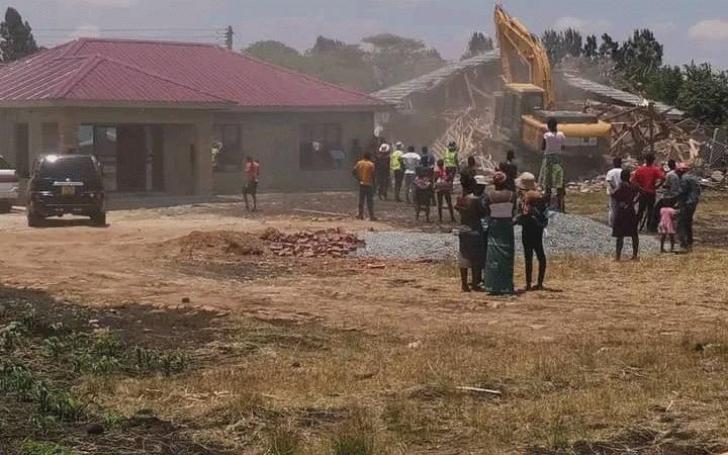News / National
Lawyers condemn forced evictions and demolition of homes in Zimbabwe
20 Nov 2024 at 07:01hrs |
0 Views

Human rights lawyers have strongly condemned the recent demolitions of houses and the forced eviction of Zimbabweans from their ancestral lands, labeling the actions as heartless and inhumane.
The Harare City Council last week carried out demolitions of several houses, claiming that they were illegally built on council land. However, the evictions were halted after a directive from the government, which intervened in the matter. These evictions are part of a broader issue in Zimbabwe, where several citizens across the country have been evicted from land allegedly occupied without lawful authority, including gazetted State land.
The Zimbabwe Lawyers for Human Rights (ZLHR), which is representing some of the victims, said that many people had been arrested and prosecuted for allegedly occupying land illegally. The human rights group has filed appeals in court, challenging these evictions as violations of citizens' constitutional rights.
In a statement, ZLHR said, "The intervention by ZLHR in representing the villagers and filing appeals in court challenging their eviction has saved them as High Court judges have set aside the evictions." The group further stressed that these forced evictions infringe on the right to freedom from arbitrary eviction guaranteed in section 74 of the Constitution, which protects citizens from being displaced without due process.
ZLHR expressed deep concern over the failure of both central and local governments to follow legal procedures when carrying out evictions. The organization made it clear that while it does not condone unlawful land occupation, it condemned the government's approach of conducting forced evictions without offering alternative housing or shelter to the displaced families.
"Forced evictions strip affected families, including women, children, and people with disabilities, of their constitutional right to protection from arbitrary eviction and dignity," ZLHR added. "This not only results in the loss of livelihoods and property but also impacts the basic social, economic, cultural, political, and civil rights of these citizens."
The organization also criticized the lack of foresight by local and central authorities, pointing out that the evictions were conducted without any provision for alternative accommodation. ZLHR labeled the actions as "inhumane and degrading treatment" that contravenes both the Zimbabwean Constitution and regional and international human rights treaties to which Zimbabwe is a signatory.
In response to the widespread displacements, ZLHR called for an immediate halt to the evictions and urged both local and central governments to ensure the protection of internally displaced persons and other vulnerable groups. The organization also suggested that local authorities should prevent illegal settlements by stopping unauthorized construction before homes are completed, rather than waiting until they are finished and then demolishing them.
Indications have surfaced that land barons, often linked to the ruling Zanu-PF party, are behind the rise of illegal settlements across the country. These actors are accused of facilitating unauthorized land occupations, which have led to the current crisis of forced evictions.
The ongoing legal battles and public outcry highlight the need for a more humane and lawful approach to land distribution and housing in Zimbabwe.
The Harare City Council last week carried out demolitions of several houses, claiming that they were illegally built on council land. However, the evictions were halted after a directive from the government, which intervened in the matter. These evictions are part of a broader issue in Zimbabwe, where several citizens across the country have been evicted from land allegedly occupied without lawful authority, including gazetted State land.
The Zimbabwe Lawyers for Human Rights (ZLHR), which is representing some of the victims, said that many people had been arrested and prosecuted for allegedly occupying land illegally. The human rights group has filed appeals in court, challenging these evictions as violations of citizens' constitutional rights.
In a statement, ZLHR said, "The intervention by ZLHR in representing the villagers and filing appeals in court challenging their eviction has saved them as High Court judges have set aside the evictions." The group further stressed that these forced evictions infringe on the right to freedom from arbitrary eviction guaranteed in section 74 of the Constitution, which protects citizens from being displaced without due process.
ZLHR expressed deep concern over the failure of both central and local governments to follow legal procedures when carrying out evictions. The organization made it clear that while it does not condone unlawful land occupation, it condemned the government's approach of conducting forced evictions without offering alternative housing or shelter to the displaced families.
"Forced evictions strip affected families, including women, children, and people with disabilities, of their constitutional right to protection from arbitrary eviction and dignity," ZLHR added. "This not only results in the loss of livelihoods and property but also impacts the basic social, economic, cultural, political, and civil rights of these citizens."
The organization also criticized the lack of foresight by local and central authorities, pointing out that the evictions were conducted without any provision for alternative accommodation. ZLHR labeled the actions as "inhumane and degrading treatment" that contravenes both the Zimbabwean Constitution and regional and international human rights treaties to which Zimbabwe is a signatory.
In response to the widespread displacements, ZLHR called for an immediate halt to the evictions and urged both local and central governments to ensure the protection of internally displaced persons and other vulnerable groups. The organization also suggested that local authorities should prevent illegal settlements by stopping unauthorized construction before homes are completed, rather than waiting until they are finished and then demolishing them.
Indications have surfaced that land barons, often linked to the ruling Zanu-PF party, are behind the rise of illegal settlements across the country. These actors are accused of facilitating unauthorized land occupations, which have led to the current crisis of forced evictions.
The ongoing legal battles and public outcry highlight the need for a more humane and lawful approach to land distribution and housing in Zimbabwe.
Source - newsday
Join the discussion
Loading comments…


































